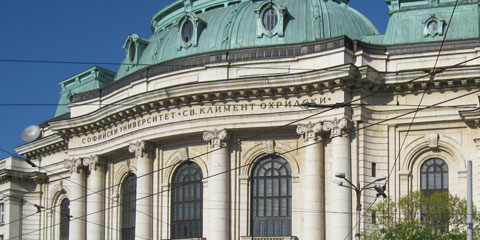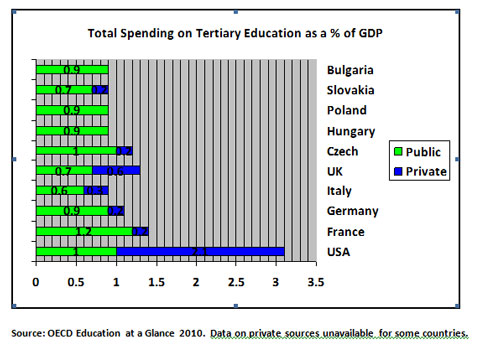 Education funding has been in the news almost daily over the last couple of months. The problem is simple: The Bulgarian government doesn’t have enough cash to adequately fund broad scale higher education. Whether this is a result of the world economic crisis, budget mismanagement, corruption, or all of the above, potential solutions are elusive.
Education funding has been in the news almost daily over the last couple of months. The problem is simple: The Bulgarian government doesn’t have enough cash to adequately fund broad scale higher education. Whether this is a result of the world economic crisis, budget mismanagement, corruption, or all of the above, potential solutions are elusive.
Protesting Against Government Budget Cuts
Students and faculty protest against budget cuts and for what they call their “right” to higher education. On the first point they hold the moral high ground. A school is not a business that can easily raise revenue or lower costs, and it is unfair to act in a capricious manner when it comes to budget funding. Funding shortfalls of 10 or 20%, representing millions of levs in the course of a single year, are impossible for a large institution to replace. It takes years to develop significant funding sources. Governance by fiat undermines the work of the university, forcing administrators to run around in search of small sums for operating expenses instead of focusing on their main task, producing qualified graduates. When large cuts are necessary, they should be preceded by lengthy periods during which the government and the institutions work together to replace the public funds through other sources.
The situation is further complicated by the practical dependence of universities on the state. Heavy bureaucratic requirements, organizational restrictions and lack of experience all stand in the way of institutions being able to stand on their own in a more competitive world. The government and the universities must work together to introduce revenue generating programs, improve fund raising capabilities, and develop private sector partnerships to bridge the funding gap.
The second point is of somewhat dubious worth, and in some respects may even be called dangerous. Claiming higher education as a “right” belies a false sense of entitlement that is almost certainly beyond the means of the Bulgarian state. Acknowledging the hard truth puts this cabinet at odds with its usually populist approach. The Bulgarian government knows that it cannot guarantee low cost higher education, and is smart to resist being boxed into a corner by self serving protesters who either do not understand or choose to ignore the real problems facing the nation.
Comparison of Spending on Higher Education
A comparison of public spending for higher education in other countries shines more light on the scope of the problem in Bulgaria. The United States invests more money in higher education than any other country in the world, spending about 3.1% of GDP each year, with two thirds of this amount sourced from the private sector. European countries typically invest a lower percentage of GDP, with a higher percentage coming from public sources. Details are shown in the table below:

The chart illustrates two important points about Bulgarian spending for education. First, it shows that Bulgarian public investment of just less than 1% of GDP seems generally in line with spending in other European countries, including other former east bloc countries. Demands for Bulgaria to invest appreciably more than they currently are appear to be unrealistic.
Second, it shows significant involvement by the private sector in university education in some countries, in particular the USA and the UK, where private sector contributions represent over 67% and 45% of total funding respectively. Overall, private sources account for 31% of total funding for tertiary education in OECD member states and partner countries.
Addressing the Education Funding Problem in Bulgaria
Sergey Ignatov, Bulgaria’s Minister of Education and Science, has tossed about several reform proposals, including a reward system for universities based on rankings and performance, improving cooperation between scientific and educational institutions, and streamlining the university system in Bulgaria.
All of these ideas have potential, as far as they go. Channeling funds to the most successful programs should improve educational outcomes. Improving cooperation between institutions should lead to realization of money-making projects. Streamlining the university system should improve efficiency and reduce waste. The problem with these proposals is that they do not go far enough.
If the core problem is a lack of resources, then the government must create a path for funds discovery independent of government programs. Encouraging corporate investment, private foundation grants, and alumni development would be a step in the right direction.
[ad#Google Adsense Bulstack 468×60 post banner]












